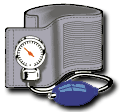|
Many
people (and their kids) flock to the free blood pressure-measuring
machines in their local supermarkets or discount stores. These
devices are widely available to the general population, and
may help enhance people's involvement with their own healthcare.
But just how accurate are they?
A recent study in the Canadian Medical Association Journal
compared the validity of three blood-pressure recording
devices: a standard automated device that has circulated publicly
since 1990, a similar but clinically validated device, and
a sphygmomanometer (the hand-held device that doctors use
to measure your blood pressure) operated by a qualified researcher.
The effectiveness of each method was determined in approximately
100 adults, based on Association for the Advancement of Medical
Instrumentation (AAMI) standards.
 Neither of the automated devices met the AAMI accuracy requirements
for systolic blood pressure. Also, neither machine was as
accurate in a community setting as in a laboratory. Based
on their findings, the authors of the study concluded that
reliance on these devices could result in "an inaccurate or
missed diagnosis of hypertension." Neither of the automated devices met the AAMI accuracy requirements
for systolic blood pressure. Also, neither machine was as
accurate in a community setting as in a laboratory. Based
on their findings, the authors of the study concluded that
reliance on these devices could result in "an inaccurate or
missed diagnosis of hypertension."
There are no published minimum standards for blood-pressure
measuring devices created for use in the community. Don't
rely on grocery-store devices to determine your true blood
pressure. Have a qualified physician accurately take your
blood pressure on a regular basis using a sphygmomano... well,
you know - the one they wrap around your arm and pump by hand.
Reference:
Lewis JE, Boyle E, Magharious L, et al. Evaluation of a
community-based automated blood pressure measuring device.
Canadian Medical Association Journal 2002:166(9), pp.
1145-1148.
For more studies on general health, go to https://www.chiroweb.com/find/archives/general.
|



